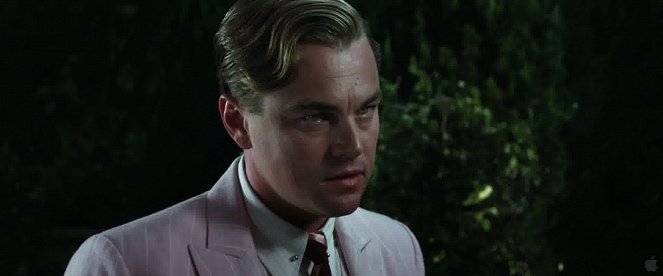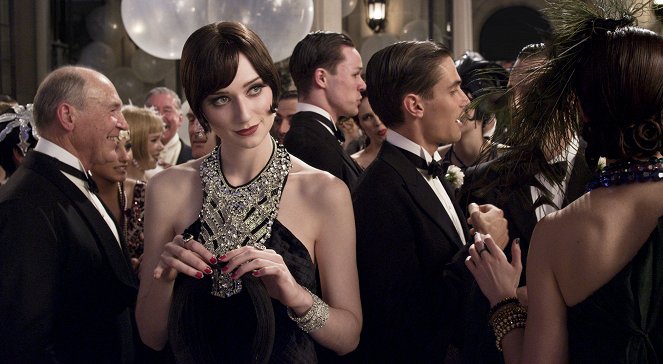Directed by:
Baz LuhrmannCinematography:
Simon DugganComposer:
Craig ArmstrongCast:
Leonardo DiCaprio, Tobey Maguire, Carey Mulligan, Joel Edgerton, Isla Fisher, Jason Clarke, Elizabeth Debicki, Jack Thompson, Amitabh Bachchan, Gemma Ward (more)VOD (4)
Plots(1)
Set in the 1920s, the story follows aspiring writer Nick Carraway (Maguire) as he moves to New York and becomes intrigued by his neighbour Jay Gatsby (DiCaprio)'s lavish lifestyle and mysterious past. As Nick finds himself caught up in the world of the wealthy, he witnesses romantic entanglement and betrayal. Gatsby's true nature is slowly exposed and his involvement with old flame Daisy Buchanan (Mulligan) ultimately leads to tragedy. (Warner Bros. UK)
(more)Videos (28)
Reviews (16)
It starts as intoxicating kitsch, then it becomes a tiresome mess stumbling on both feet. As far as gimmicky camera tricks and image wizardry go, Luhrmann is confident, but he fails in simple meaningful storytelling and in trying to get under the skin of the characters. I've mentioned kitsch – all those lavish parties make you feel like you're looking at a big garden dwarf, festooned with colourful ribbons and flashing light bulbs. But when it comes to feelings, it's like a shallow story in a girlie magazine, kind of plucking the daisy "He likes you, he likes you not, he likes you, he likes you not, he'll leave with you, he won't leave with you.....". Thank goodness for at least two things: Edgerton's manly Buchanan, the only full-blooded character in the entire panopticon, and the reunion scene between Gatsby and Daisy – the only moment in the entire film where you can feel any emotion. Luhrmann is getting a little stale.
()
From the first pages of the book, I knew that The Great Gatsby was the perfect material for Baz Luhrmann. And for me, as a person who 12 years ago couldn't catch a breath during the audiovisual musical version of Paris, the first half is a dream that I thought would never come true. A naive narrator, a perfect modern soundtrack, and captivating camera tricks that made me want to melt into the screen and stay there forever. Luhrmann simply knows what he's good at, and when his characteristic (sometimes almost carbon copied) narrative tricks are supported by the noble Leonardo DiCaprio, there is no doubt that the words "The Great" in the title are fully deserved. I am disappointed with the last act of the story just like I was with the book; F. Scott Fitzgerald stumbled a bit with the ending. And while it became somewhat bitter in places in light of the greater emphasis on the societal aspect, Luhrmann does not deviate from the opulent form for a moment. His storytelling is not a general social warning, but rather cautiously interhuman on a much smaller scale. And this more restrained approach far more aptly fits the story of love that was worth all the effort and suffering.
()
The time arc of 1922/1929 (or richer, as the flashbacks chart Gatsby's entire life) did not disappoint. That's what I call a film that I experience inwardly. A formal and dramatic orgasm. The overall production design alone is perfection (this isn't just any 1920s movie, this is the exact 1920s that I live for). ___ The flawless soundtrack has me undulating to "Young and Beautiful" (Lana del Rey), "Love is Blindness" (Jack White), and the searing "Bang Bang" (Will.i.am).
()
What part of it makes us more crazy? That, according to Luhrmann, Fitzgerald is a superficial mannerist from the garrulous red library? That the 1920s look like a forgettable industrial dystopia mixed with the extravaganza of a lifestyle magazine? That the "glamor" aesthetic of the film is so ostentatious that it is annoying? That the characters are without exception flat and the most superficial is, coincidentally, the narrator? That the film has a totally nonsensical dramatic construction? That there is nothing left of the elegance and decadence of the "before the great fall" epoch but a flood of confetti and digital sterility? I don't even know and I really didn't care after a few minutes. A silly experience that is best described to me by Rex Reed's words: "This is one of the most maddening examples of wasted money ever dumped on the screen".
()
This theatrical love triangle has lively visuals, but a dull soul. Baz Luhrmann uses all the tricks that worked in Moulin Rouge! but does not come even close to depth of the portrayal of of tragic love achieved in the musical. We get to the character of Gatsby slowly, with great anticipation, and Leonardo DiCaprio looks good in his pastel suits (like everyone else), but his character paradoxically turns out to be the most impersonal and contradictory element of the film. We don’t really care about him, even though the film tells the story of his journey towards his dream, embodied by the beautiful Daisy. Carey Mulligan is merely an ornament, Joel Edgerton as her gruff husband is more noticeable than DiCaprio’s Gatsby. The only natural character is the “representative of the people” played by Tobey Maguire. Moulin Rouge! was energized and brought to life by its original energetic and emotionally engaging songs. The Great Gatsby pulls out Jay-Z’s overused hits (identifying with New York) and futilely tries to add a romantic dimension to a book of opulent pictures by using a captivating song by Lana Del Rey. Such a powerful theme, so many big thoughts ... And the viewer’s eyes will remain dry. ___ Second viewing: The scene of the confrontation of characters in the hotel room – if the whole film was done so intimately, in a psychologically concentrated fashion and dramaturgically sensitively, i.e. without unnecessary formal excesses and, in terms of music, satisfied itself with Lana Del Rey in key scenes, it could have been extraordinary.
()



Ads